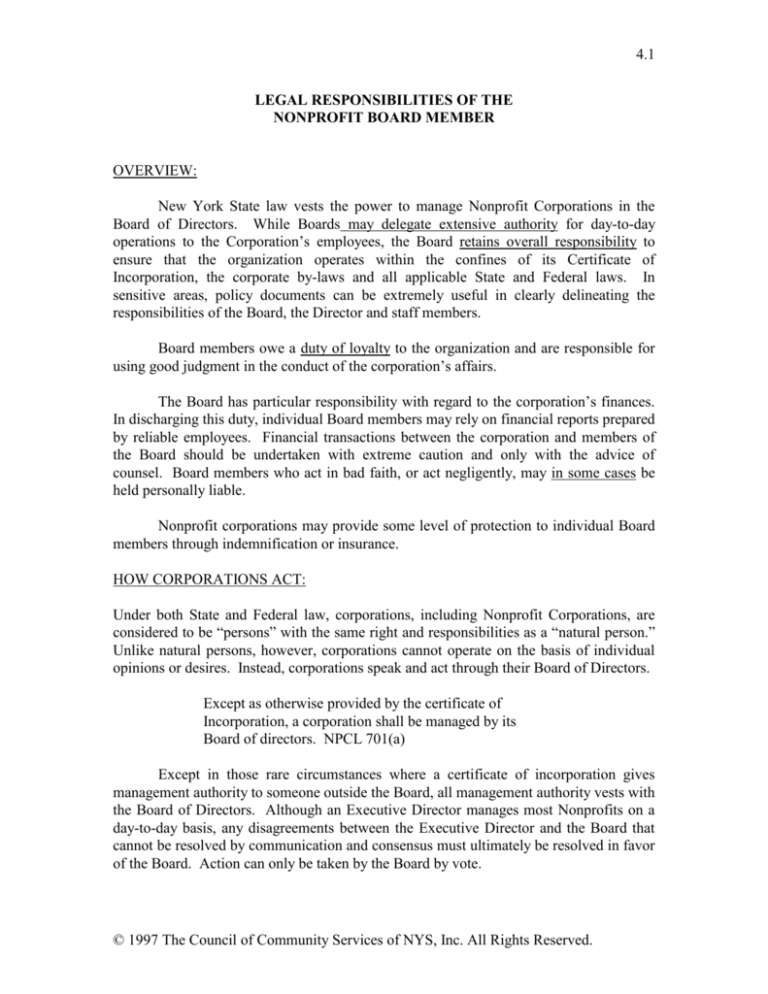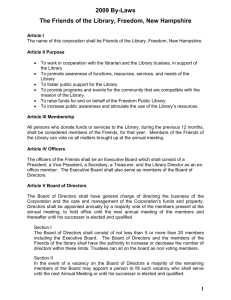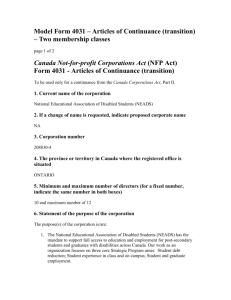
4.1
LEGAL RESPONSIBILITIES OF THE
NONPROFIT BOARD MEMBER
OVERVIEW:
New York State law vests the power to manage Nonprofit Corporations in the
Board of Directors. While Boards may delegate extensive authority for day-to-day
operations to the Corporation’s employees, the Board retains overall responsibility to
ensure that the organization operates within the confines of its Certificate of
Incorporation, the corporate by-laws and all applicable State and Federal laws. In
sensitive areas, policy documents can be extremely useful in clearly delineating the
responsibilities of the Board, the Director and staff members.
Board members owe a duty of loyalty to the organization and are responsible for
using good judgment in the conduct of the corporation’s affairs.
The Board has particular responsibility with regard to the corporation’s finances.
In discharging this duty, individual Board members may rely on financial reports prepared
by reliable employees. Financial transactions between the corporation and members of
the Board should be undertaken with extreme caution and only with the advice of
counsel. Board members who act in bad faith, or act negligently, may in some cases be
held personally liable.
Nonprofit corporations may provide some level of protection to individual Board
members through indemnification or insurance.
HOW CORPORATIONS ACT:
Under both State and Federal law, corporations, including Nonprofit Corporations, are
considered to be “persons” with the same right and responsibilities as a “natural person.”
Unlike natural persons, however, corporations cannot operate on the basis of individual
opinions or desires. Instead, corporations speak and act through their Board of Directors.
Except as otherwise provided by the certificate of
Incorporation, a corporation shall be managed by its
Board of directors. NPCL 701(a)
Except in those rare circumstances where a certificate of incorporation gives
management authority to someone outside the Board, all management authority vests with
the Board of Directors. Although an Executive Director manages most Nonprofits on a
day-to-day basis, any disagreements between the Executive Director and the Board that
cannot be resolved by communication and consensus must ultimately be resolved in favor
of the Board. Action can only be taken by the Board by vote.
© 1997 The Council of Community Services of NYS, Inc. All Rights Reserved.
4.1
(A)ny reference in the Nonprofit Corporation
Law to corporate action...shall mean such action
taken at the meeting of the board.
(T)he vote of a majority of the directors present at
the time of the vote, if a quorum is present at such
time, shall be the act of the board. NPCL 708(d)1
An individual Board member cannot act on behalf of the corporation, unless so
deemed by a vote of the majority of the board members present at the meeting. Boards
may also delegate some of their responsibility and power to committees.
If the certificate of incorporation or the by-laws so
provide, the board ... may designate from among its
members an executive committee or other standing committees
The full Board of Directors can give committees all the power which the Board
itself possesses, except that committees may not submit matters to members of the
corporation, fill vacancies, fix compensation for directors, amend or repeal the by-laws or
amend or repeal resolutions of the full board.
THE DUTY OF DIRECTORS:
Directors and officers shall discharge the duties of their
respective positions in good faith and with that degree of
diligence, care and skill which ordinarily prudent men would
exercise under similar circumstances in like positions.
When directors act in good faith and use reasonable care and diligence in making
their decisions, they are generally protected from liability. This rule, usually called the
“business judgment rule” is designed to protect Board members from endless secondguessing and to encourage talented people to serve their community on Nonprofit Boards.
What constitutes the “degree of diligence, care and skill which ordinarily prudent
men would exercise under similar circumstances” is difficult to state precisely. Under the
Business Corporation Law, directors have been found liable for failure to use reasonable
care where they fail to attend Board meetings, or “attendance without alertness” or failure
1
In many circumstances, a vote of the Nonprofit Board must be greater than a simple majority of those
present at the meeting. For example, purchase or sale of real estate requires a two-thirds vote of the entire
board (NPCL 509); disposition of substantially all corporate assets usually requires a two-thirds vote of the
entire Board (NPCL 510); the designation of Board committees requires a majority vote of the entire Board
(NPCL 712); amendment of the Certificate of Incorporation requires a majority of the entire Board (NPCL
802); and a petition for judicial dissolution of the corporation requires a vote of the majority of all directors
(NPCL 1102). This is not a complete list; the NPCL contains a number of other examples. The corporate
By-laws may also require more than a majority vote on some issues.
© 1997 The Council of Community Services of NYS, Inc. All Rights Reserved.
4.1
to pay attention to clear signs of mismanagement. Directors have an obligation to speak
out against actions that are illegal, immoral or against the best interests of the corporation.
In discharging these duties, Directors are not obligated to personally examine the
books and records of the corporation.
(Directors) and officers, when acting in good faith, may
rely on information, opinions, reports or statements and
other financial data, ... prepared or presented by:
(1) officers or employees of the corporation whom the
director believes to be reliable and competent,
(2) counsel, public accountants or (other professionals,
acting in) matters which the directors...believe to be
within such person’s professional or expert competence, or
(3) a committee of the board on which they do not serve, ...
which committee the directors believe to merit confidence. NPCL 717.
In relying on these reports, Directors are held to the same standard of good faith
and reasonable care. Directors are not entitled to rely on reports if they know that those
reports are false, if they know the person making the report is unreliable or if they fail to
make minimal efforts to understand the report and judge its reliability.
In addition to the duty to use good judgment in corporate management, directors
have a “fiduciary” relationship to the organization. A “fiduciary” is a person in a position
of trust relative to another who has a special duty not to betray that trust. Attorneys are
fiduciaries to their clients and Trustees have a fiduciary responsibility to the assets of the
trust. Directors have the same fiduciary-trust relationship with the corporation.
(I)t is well-established that, as fiduciaries, board members
bear a duty of loyalty to the corporation and “may not profit
improperly at the expense of their corporation.” Scheuer Family
Foundation v. 61 Assoc., 179 A.D.2d 65 (4th Dept. 1992)
Contracts between directors and the corporation in which the director derives
some payment or benefit are particularly troublesome. Any such contract raises the
possibility that one or more Directors are acting on behalf of individual profit rather than
the best interests of the corporation. It is important to understand that contracts between
Nonprofit Corporations and their individual Directors are not illegal. So long as the
contract is fair to the corporation, a Director does not breach his or her fiduciary duty by
making a profit from a contract with the corporation.
© 1997 The Council of Community Services of NYS, Inc. All Rights Reserved.
4.1
Because of the obvious potential for abuse, contracts between the corporation and
members of the Board should be examined extremely closely by all Board members.
Board members who have a financial interest in the contract should fully disclose the
nature of their interest and should not vote 2. Disinterested Board members should satisfy
themselves that the contract is truly in the Corporation’s best interest and avoid the
temptation to “go along” with a particular transaction so as not to offend fellow Board
members. In most cases, the Board should seek the advice of legal counsel.
Loans should never be made by the corporation to individual Directors. A loan by
a Nonprofit to a Director is “a violation of the duty to the corporation of the directors or
officers authorizing it or participating in it.” NPCL 716.
PERSONAL LIABILITY OF DIRECTORS IN CERTAIN CASES:
The Nonprofit Corporation Law specifically provides for personal liability of
directors in certain specified cases.
Directors of a corporation who vote for or concur in
any of the following corporate actions shall be jointly
and severally liable, ... to the extent of any injury
suffered by the corporation as a result of such action:
(1) The distribution of the corporation’s cash or property
to members, directors or officers...,
(2) [For corporations with members, the repayment of
members’ capital contributions in violation of the statute].
(3) Payments to holders of subvention certificates or
payment of interest to bondholders in excess of the
amount permitted by law.
(4) The distribution of assets after dissolution of the
the corporation in violation of [law] or... without paying
... all known liabilities.
(5) The making of loan contrary to section 716 (loans
to Directors). NPCL 719.
The New York Nonprofit Corporation Law requires Board members to disclose all “material facts as to
such director’s ... interest in such contract.” NPCL 715. The law does not directly prohibit interested
Directors from voting on their contract, as long as the vote would have passed without that Directors vote.
NPCL 715.
2
© 1997 The Council of Community Services of NYS, Inc. All Rights Reserved.
4.1
Any Director present at a meeting where such actions are taken is presumed to
concur “unless his dissent thereto shall be entered in the minutes” or “unless he shall
submit his written dissent to the ...secretary.” NPCL 719.
OTHER SUITS AGAINST BOARD MEMBERS:
Board members may be sued by the Attorney General, by other Board members,
members of the corporation, a trustee in bankruptcy or a judgment creditor for
(1) The neglect of ... duties in the management .. of
corporate assets committed to his charge.
(2) The acquisition by himself, transfer to others, loss
or waste of corporate assets.
(3) To set aside an unlawful transfer of assets.
TAXES:
Most Nonprofits are exempt from taxation on “profits” from their activities.
However, any organization that has employees is liable for payroll taxes and individual
board members are among those who can be found personally liable to the IRS if payroll
taxes are not paid. When payroll taxes are unpaid, the IRS looks for a “responsible
person.” While the bookkeeper, Executive Director or treasure may all be “responsible
persons,” Board members may also be included if they hold an office, sign checks, or
participate in decisions as to disbursement of funds or payment of creditors. Liability for
unpaid payroll taxes applies to all responsible persons, not just the most responsible
person. Turnbull v. United State, 929 F. 2d 173 (5th Cir. 1991).
Effective July 30, 1996, the Internal Revenue Code has been amended to provide
some protection for Board members. Board members are exempt from payment of any
penalty if they are unpaid volunteers, serving in an honorary capacity, and do not
participate in day-to-day financial operations or have actual knowledge of the failure to
pay taxes. 26 U.S.C.A. 6672 (e). This exemption does not apply if it results in no one
being liable.
SPECIAL PROVISIONS FOR 501(C)3 CORPS:
The Nonprofit Corporation Law provides that Directors of 501(c)3 corporations
(Federal tax-exempt status) are immune for liability for acts as Board members unless
“the conduct of such director... constituted gross negligence or was intended to cause...
harm.” NPCL 720a. Directors of Nonprofits that are not 501(c)3s are judged by the
“negligence” standard rather than the “gross negligence” standard.
© 1997 The Council of Community Services of NYS, Inc. All Rights Reserved.
4.1
INDEMNIFICATION AND INSURANCE:
“Indemnification” means the obligation to reimburse someone for his or her
losses. In this context, Nonprofits are permitted to “indemnify” Board members by
agreeing to pay the Board members’ attorneys’ fees, litigation and any fines or judgments
imposed. In order for the corporation to pay, the Director must have acted in good faith
and must have reasonably believed that his or her course of conduct was lawful. NPCL
722.
Nonprofits may also buy “Director’s Insurance” which will pay the corporation if
the corporation is forced to indemnify any of its Directors, or which can pay the Directors
for these expenses directly. NPCL 726. While the number of claims against these
policies appears to be small, Directors liability insurance is often helpful in alleviating
concern of potential Board members.
© 1997 The Council of Community Services of NYS, Inc. All Rights Reserved.









